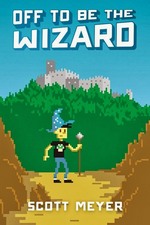 Off to be the Wizard
Off to be the Wizard
by Scott Meyer, Luke Daniels (Narrator)
Series: Magic 2.0, #1
Unabridged Audiobook, 10 hrs, 15 min.
Brilliance Audio, 2014
Read: August 8 – 16, 2016

I’m just going to steal most of what I said about the book before and add a little bit at the end about the audiobook — and Daniels in particular.
The first thing Martin always did when he found some new data file was to search for his own name. It may seem egocentric, but Martin wasn’t worried about that. He had spent a lot of time thinking about himself, and had come to the conclusion that he was definitely not self-absorbed.
There’s a great temptation — and frequently a rush — when discussing an amusing/funny book in SF or Fantasy to compare it with, well — the name rhymes with Schmouglas Schmadams — this can be damning, because almost nothing can live up to it. So I’m going to resist even saying the name. If anything, I think you could say this was reminiscent of Schmon Schmalzi — only funnier.
Martin Banks is the rather unimpressive hero here — a college dropout, living in a poorly-furnished apartment, working in “a cubicle farm, . . . a fluorescent-lighted, beige-walled abattoir for the human spirit where he had to spend most of his time,” and doing some minor hacking on the weekends, just to amuse himself. He stumbles upon a way to manipulate reality, to change things just a little bit here and there around him. Being human, it takes very little time before he begins using that ability in a way to draw the attention of the Federal Authorities. Which is not all that comfortable, so he heads off to England in the Middle Ages where he figures he can do okay for himself, living as a wizard using these abilities.
That’s when things start to get really entertaining (and I had no complaints up to this point). Anything more I say on this front is a horrible spoiler, so we’ll just leave it with really entertaining.
This is a coming of age tale — and, as it’s about a Millennial, it’s a delayed-coming-of-age story. But Martin’s not one of those protagonists that you have to see mature before you like him — you connect with him right away (or you’re probably wasting your time reading on). He definitely doesn’t mature in your typical way, which is part of the fun. I can’t help comparing Martin to Wesley Chu’s Roen Tan. But without the stakes that Roen had to deal with (and a nicer mentor).
Most of the characters we get to know are met after Martin’s time jump — so don’t worry if you find everyone in 2012 a little shallow and undeveloped. They are, but other people won’t be.
There are several things in the book that won’t hold up to much scrutiny — like his ability to get a smartphone signal in Dover, England in 1150. Adapt the advice Joel and the ‘bots used to give us, “just repeat to yourself . . . you should really just relax.” It’s worth it.
The book is just littered with wit — from the extended jokes, the funny visuals, or little asides like: “The fact that wristwatches weren’t invented yet made it difficult to look impatient, but he managed.” On nearly every page, there’s something to make you chuckle or laugh — or at least grin. I laughed enough that it was annoying to my family — not that I cared, mind you. But it’s not just a yuk-fest, there’s a well-written story here, in a great world with some characters you want to spend time with.
Daniels scores again here — his performance didn’t really remind me of his work on the Iron Druid Chronciles, which, I have to admit I was a little worried about. I got a kick out of his voice choices for Martin and Jimmy in particular — Martin’s voice when he got excited was perfect. I’m not sure I liked his choice of voice for Philip — it reminded me too much of Douglas Reynholm from The IT Crowd (I’m probably the only person on Earth who hears that, so take it with a grain of salt), and I never got used to it. But I loved everything else he did, so who cares, right? If anything, Daniels’ narration helped the material (not that it needed it).
Meyer’s writing holds up to a second-read, even jokes/situations I knew were coming worked pretty well — more than well, actually, judging by my laughter. I enjoyed it as much the second time through as the first, so that’s a pretty good sign.
—–




